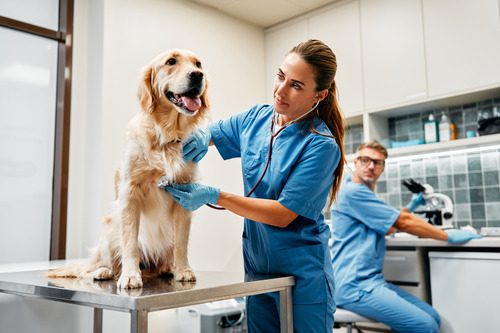Discovering blood in your dog’s stool can be upsetting, especially if it happens unexpectedly or seems to come out of nowhere. While it’s easy to assume the worst, this symptom doesn’t always point to a serious health issue, but it is never something to ignore. In many cases, blood in dog stool is a sign that something in the digestive tract isn’t functioning as it should. Whether it’s the result of a minor irritation or a more advanced medical problem, a prompt evaluation at Acton Animal Hospital can provide the answers you need. If you’ve recently noticed blood in your dog’s stool, please call us at 978-263-7477 to schedule an appointment.

What Causes Blood in Dog Stool?
Blood in dog stool can appear for a variety of reasons, ranging from harmless to more concerning. This symptom may show up as bright red streaks or a darker, tarry consistency, depending on where in the gastrointestinal tract the bleeding occurs. Pinpointing the cause begins with a physical exam and may include diagnostics to rule out infections, parasites, trauma, or more complex conditions.
Hematochezia vs. Melena
When you see blood in dog stool, its appearance can help your veterinarian determine where the bleeding is coming from. Bright red blood, known as hematochezia, usually indicates bleeding in the lower gastrointestinal tract—typically the colon or rectum. This form of blood often looks fresh and may be seen on the surface of a formed stool.
Melena, on the other hand, presents as dark, tarry stool. This type of blood has been digested and usually originates from the stomach or upper small intestine. Melena can be harder to detect without a trained eye, but it signals internal bleeding that requires immediate attention.
Common Causes of Blood in Dog Stool
A few of the most common reasons dogs may pass stool with blood include:
- Dietary indiscretion (eating spoiled food or foreign objects)
- Intestinal parasites such as hookworms or whipworms
- Bacterial or viral infections
- Inflammatory bowel disease (IBD)
- Colitis or inflammation of the colon
- Rectal injuries or anal sac issues
- Stress-related gastrointestinal upset
It’s also possible for blood in dog stool to result from more serious conditions, such as tumors or immune-mediated diseases. In any case, an accurate diagnosis starts with a veterinary exam.
Diagnosing Blood in Dog Stool at Acton Animal Hospital
When you bring your dog to Acton Animal Hospital for blood in their stool, our veterinary team takes a methodical approach to diagnosis. Because this symptom can point to several different causes, we use a combination of your dog’s history, a physical examination, and diagnostic tools to gather all the necessary information.
What to Expect During the Appointment
Our team will ask about your dog’s recent behavior, appetite, energy levels, and stool patterns. We may also ask about any recent changes in diet, exposure to other animals, or access to objects they shouldn’t be eating. Based on your answers and what we find during the exam, we may recommend testing such as:
- Fecal analysis to check for parasites or harmful bacteria
- Bloodwork to evaluate organ function and rule out systemic illness
- Abdominal imaging to assess internal structures
Identifying the reason behind blood in dog stool helps us decide on the most effective treatment path. If your dog is experiencing this symptom, please call 978-263-7477 to schedule an appointment today.
When Blood in Dog Stool Is an Emergency
Not every case of blood in dog stool is an emergency, but some situations require immediate medical care. If your dog appears otherwise healthy and the symptom is isolated, you can usually wait for a scheduled appointment. But in more severe cases, time matters.
Signs You Should Seek Urgent Care
Please contact us right away or go to the nearest emergency hospital if your dog experiences any of the following along with blood in their stool:
- Vomiting (especially if it includes blood)
- Weakness or collapse
- Pale gums
- Refusal to eat or drink
- Abdominal bloating or discomfort
- Repeated episodes of diarrhea or bloody stool
These signs could point to internal bleeding, severe infection, or poisoning. Immediate veterinary attention can make a significant difference in your pet’s outcome.
How Stress and Diet Can Affect Digestive Health
It might come as a surprise, but emotional stress and dietary changes can both lead to blood in dog stool. While these are typically less serious causes, they still deserve attention—especially if your dog experiences recurring episodes or other signs of discomfort.
Diet-Related Triggers
Dogs that eat unfamiliar or spoiled food may develop gastroenteritis, an inflammation of the stomach and intestines. This condition often causes vomiting, diarrhea, and sometimes blood in the stool. Food sensitivities or abrupt changes in diet can also disrupt the balance of your dog’s digestive system. To help avoid these issues, introduce new foods gradually and monitor your dog for any changes. If you notice consistent blood in dog stool after eating certain foods, a diet trial may be needed to identify intolerances.
The Impact of Stress
Changes in routine, travel, or time spent in a kennel can cause stress colitis in some dogs. This condition often results in loose stool with bright red blood or mucus. While not always dangerous, stress colitis can make your dog uncomfortable and may require treatment to prevent complications. If your dog seems anxious or has had recent changes to their environment, let your veterinarian know during the appointment. This information helps us piece together the puzzle and provide the right support for your pet.
Parasites and Infections That Can Cause Bloody Stool
Parasites are one of the most common causes of blood in dog stool, especially in puppies or dogs who frequent dog parks or boarding facilities. Many intestinal parasites are easily spread and can lead to a range of digestive symptoms. The most frequently diagnosed parasites in dogs include:
- Hookworms
- Whipworms
- Roundworms
- Giardia
These organisms irritate the intestinal lining and may cause diarrhea, blood in stool, weight loss, or a poor coat condition. In some cases, infections may be subclinical, meaning your dog shows few outward symptoms. Routine fecal testing is the best way to catch parasitic infections early.
Bacterial and Viral Causes
Certain bacteria such as Salmonella or Clostridium perfringens can lead to inflammation and bleeding in the intestines. Viral conditions like parvovirus are more serious and often affect unvaccinated dogs or puppies. These illnesses typically result in profuse bloody diarrhea and require immediate care. If you suspect your dog has a parasite or infectious disease, schedule an appointment at Acton Animal Hospital by calling 978-263-7477. Timely treatment can prevent complications and reduce the risk of spreading illness to other pets.
Why Prompt Veterinary Care Matters
Whether it’s mild or more alarming, blood in dog stool should always be assessed by your veterinarian. This symptom may go away on its own, but it can also return or worsen without proper intervention. A veterinary visit allows us to find the cause, rule out more serious conditions, and provide the care your dog needs to feel better. We understand how concerning this issue can be, and we’re here to help guide you through the next steps. If you’ve noticed blood in your dog’s stool, please call Acton Animal Hospital at 978-263-7477 to book an appointment. Your dog’s health and comfort are important to us, and we’re ready to help you find answers.
Recent Posts
About Us
Our veterinarians in Acton, MA bring over 80 years of combined experience and a multitude of services for your pet.
